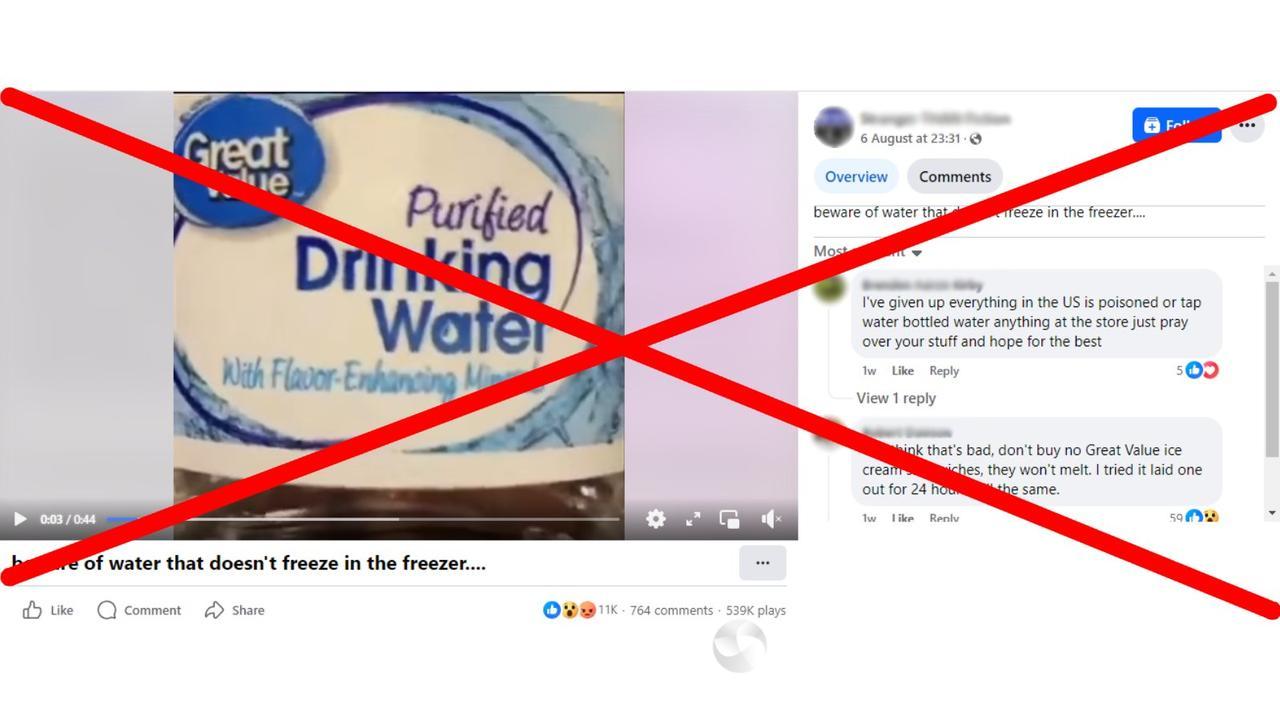AAP FACTCHECK – The pharmaceuticals multinational Pfizer is “trying to kill us” by adding a chemical called calcium chloride to bottled water, according to a video on social media.
This is false. Pfizer does not produce calcium chloride for food or drink, and the chemical is used in a range of food and drinks anyway, in quantities that are safe to consume.
The claim was made in a video on Facebook with a caption that reads: “Beware of water that doesn’t freeze in the freezer.”
The video includes a man holding a bottle of water who says: “My wife said her dang water tasted funny. I then looked at what’s in there: calcium chloride. Guess who puts out calcium chloride? Pfizer.”
The man then claims calcium chloride is used as a “de-icer for your car”.
“This ain’t for drinking,” the man says. “Why is Pfizer messing with drinking water? Man, this stuff is going back to the store, they’re trying to kill us.”

The water shown in the video is Great Value Purified Drinking Water “with flavor-enhancing minerals” from the US store, Walmart.
Calcium chloride is listed as one of the product’s ingredients.
Pfizer produces a calcium chloride injection, which is used to treat hypocalcemia (low blood calcium). However, a Pfizer spokesperson said it only supplies products for use in pharmaceuticals, confirming: “We do not supply to the food and beverage industry.”
While calcium chloride has industrial uses, it is also widely used in food and beverages.
University of Auckland chemical data scientist Lisa Pilkington told AAP FactCheck calcium chloride is a common food additive used to enhance certain properties of food and is well regulated.
“Its use in this capacity has been widely studied and assessed for its safety,” Dr Pilkington said.
“In New Zealand it is in a number of foods. If you look at the food label and it has the number 509, this indicates that calcium chloride is present.”
In bottled water, calcium chloride may be added for taste, she said.
“Purifying water to bottle it removes all the minerals that make water taste like water, so they add non-toxic compounds, including calcium chloride, back in to help improve the taste,” Dr Pilkington said.
Calcium chloride is also an electrolyte, which helps the body to rehydrate and is often added to energy and sports drinks. Additionally, the chemical is commonly used as a firming agent, she said, which can prevent canned fruit and vegetables going “mushy”.

University of Melbourne honorary chemistry professor Ian Rae told AAP FactCheck calcium chloride is an inorganic compound that separates into calcium and chloride ions when it dissolves in water.
Both calcium and chloride ions are naturally found in common food and drinks, including table salt and milk.
According to a 2016 paper on the chemical characteristics and health effects of natural mineral waters, both are also minerals naturally found in mineral water.
An assessment of calcium chloride by regulator the National Industrial Chemicals Notification and Assessment Scheme (now the Australian Industrial Chemicals Introduction Scheme), states both calcium and chloride naturally exist in high concentrations in the body and are essential for life.
Therefore, the assessment states, “calcium chloride can be expected to have very low systemic toxicity … calcium and chloride ions are essential body constituents in all animal species” (page 5).
Levels of both ions are also naturally regulated by the body and animal tests found calcium chloride has low acute toxicity (p5).
The assessment lists a number of industrial applications for calcium chloride, including as a “de-icer” and antifreeze agent.
Professor Rae said many industrial chemicals are also used in food and drink, including table salt (sodium chloride), which also works as a de-icer.
However, Prof Rae explained the concentration of calcium chloride in bottled water would be nowhere near enough to prevent it from freezing in the freezer, as the post claims.
The US Food and Drug Administration has designated calcium chloride as “generally recognized as safe” for a range of culinary uses, including as a flavour enhancer, anti-caking agent and for curing and pickling.
A similar claim was fact-checked by USA Today in 2020 and found to be false.
The Verdict
False – The claim is inaccurate.
AAP FactCheck is an accredited member of the International Fact-Checking Network. To keep up with our latest fact checks, follow us on Facebook, Twitter and Instagram.
All information, text and images included on the AAP Websites is for personal use only and may not be re-written, copied, re-sold or re-distributed, framed, linked, shared onto social media or otherwise used whether for compensation of any kind or not, unless you have the prior written permission of AAP. For more information, please refer to our standard terms and conditions.


















